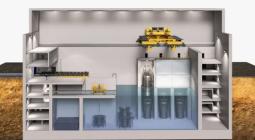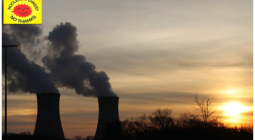EU aims to deploy Europe’s first small nuclear reactor ‘by 2030’
Small modular reactors (SMRs) will be partly relied upon to meet the EU’s 2040 climate objectives, with an industrial alliance to be launched shortly and the first reactors deployed “by 2030”, the European Commission announced on Tuesday (6 February).
The Commission unveiled on Tuesday its recommended climate objective for 2040: to reduce the EU’s greenhouse gas emissions by 90% compared to 1990 levels.
To achieve this, the EU’s dependence on fossil fuels must be reduced by 80% by 2040 compared to 2021.
To this end, the European executive “recognises the potential contribution of Small Modular Reactors to achieving the energy and climate objectives of the European Green Deal”, reads a statement from the EU executive.
These reactors will even benefit from an industrial alliance, the European Commission confirmed on Tuesday.
“We have decided to establish an industrial alliance on small modular reactors to facilitate the deployment of the first reactors by 2030 in the countries that choose to do so,” said Kadri Simson, the EU’s energy commissioner.
SMRs built on European soil will respect the “highest standards” for safety and sustainability, she assured.
300 MW of nuclear power
The EU’s initiative on SMRs has been eagerly expected for several months.
Small modular reactors (SMRs) are equipped with existing, but miniaturised, technologies inspired by nuclear-powered submarines or aircraft carriers. Their maximum output is around 300 megawatts (MW), compared with 700 to 1,600 MW for a larger “standard” reactor.
Because of their size, power and lower resource requirements than “standard” reactors, SMRs could ensure the stability of the electricity grid in countries with a high share of intermittent renewables. To this end, they are ideally suited to replacing coal-fired plants.
“The deployment of SMRs will bring significant benefits to Europe, including greater energy sovereignty, lower CO2 emissions, new jobs and economic growth,” said Yves Desbazeille, Managing Director of Brussels-based nuclear advocacy group Nuclear Europe, following the Commission’s announcement.
Nuclear Europe should also be part of the steering committee of the future SMR alliance, as revealed by Euractiv France in early December. According to an organisation chart seen by Euractiv, the work would be organised into seven working groups bringing together the players involved in the alliance, ranging from technology developers to safety authorities and civil society groups.
Several companies have already declared their intention to join the alliance, including advanced modular reactor (AMR) developers NAAREA and Newcleo.
Playing in the big league
The alliance aims to facilitate European cooperation in the development of the first European SMR projects by 2030.
It is also hoped that Important Projects of Common European Interest (IPCEI) will rapidly emerge in this field, just as they have in the solar, battery and hydrogen value chain.
The world’s great powers – China, India, the United States and Russia – are also developing their own plans. The USA is already involved in projects with Belgium and Italy, and is aiming to deploy Europe’s first American-made small modular nuclear reactor in Romania and Czechia by the end of the decade.
As a result, “it is crucial that the EU does not lag behind in the field, where at least until now we have been leading in terms of knowledge and experiences,” said Franc Bogovič, a Slovenian MEP from the centre-right European People’s Party (EPP) who drafted a parliamentary initiative report on SMRs voted in December.
“Europe has the technological and industrial potential to catch up with the United States, China and Russia in this field,” Valérie Faudon, general delegate of the French Nuclear Energy Society, told Euractiv France.
Historic day for nuclear power
In parallel, representatives of the European Parliament and EU member states also validated on Tuesday the inclusion of the nuclear industry ecosystem in the Net Zero Industry Act (NZIA), which promotes the technologies considered essential to the EU’s decarbonisation
At the time of the European Commission’s proposal last March, the inclusion of nuclear power was not a foregone conclusion.
But the shift in favour of nuclear power is such that anti-nuclear groups are calling yesterday’s announcement a “black day”.
“The launch of this alliance signals a dangerous change of direction for the EU institutions, driven by the nuclear industry’s growing demands for public funding and administrative support,” argues the European Environmental Bureau (EEB), a network of green NGOs.
In the EEB’s view, SMRs are also too expensive, hypothetical, and problematic in terms of fuel supply as well as waste management.
Cover photo: “We have decided to establish an industrial alliance on small modular reactors to facilitate the deployment of the first reactors by 2030 in the countries that choose to do so,” said Kadri Simson, the EU's energy commissioner. [Photo credit: Source: EC - Audiovisual Service]





